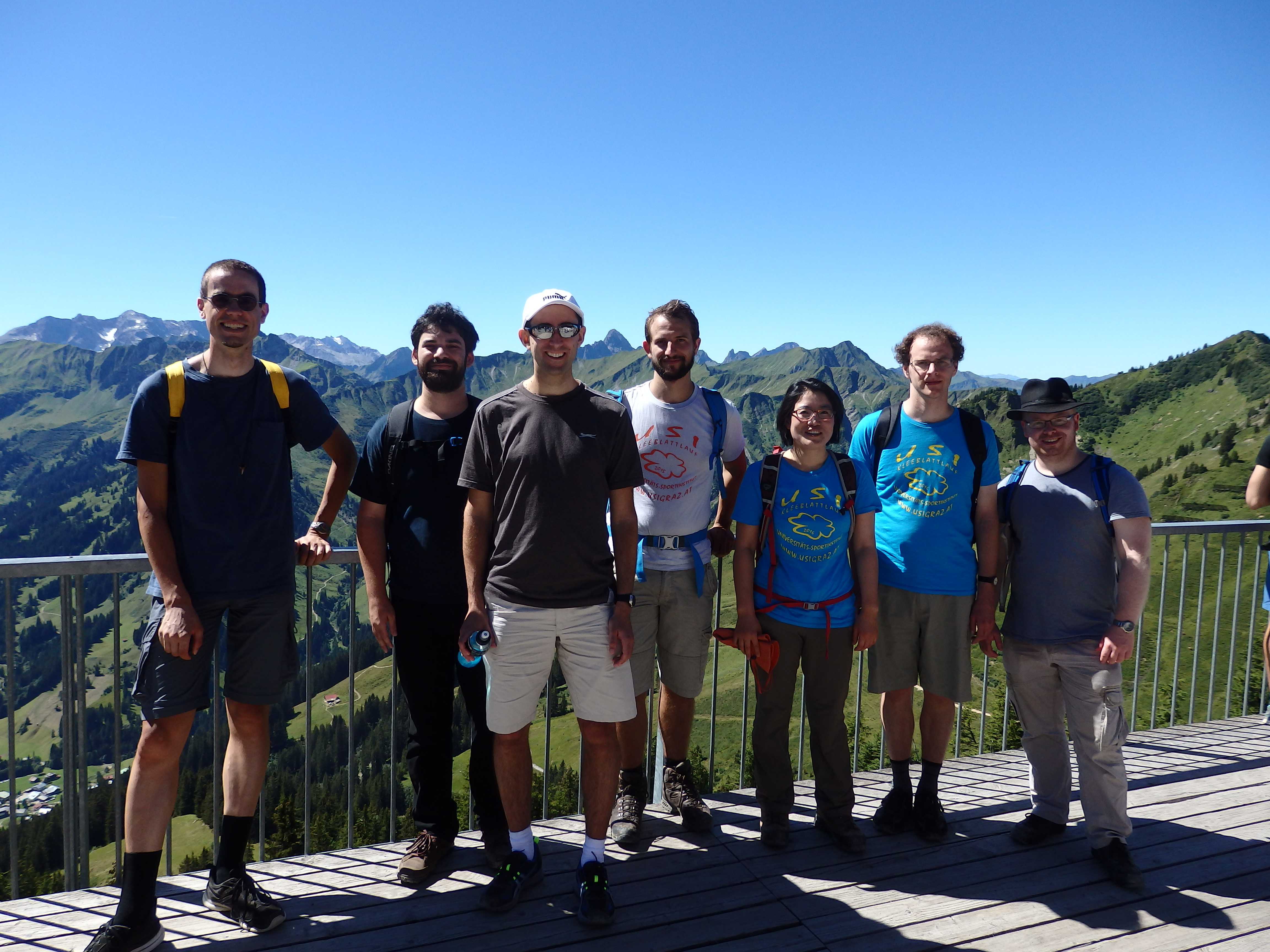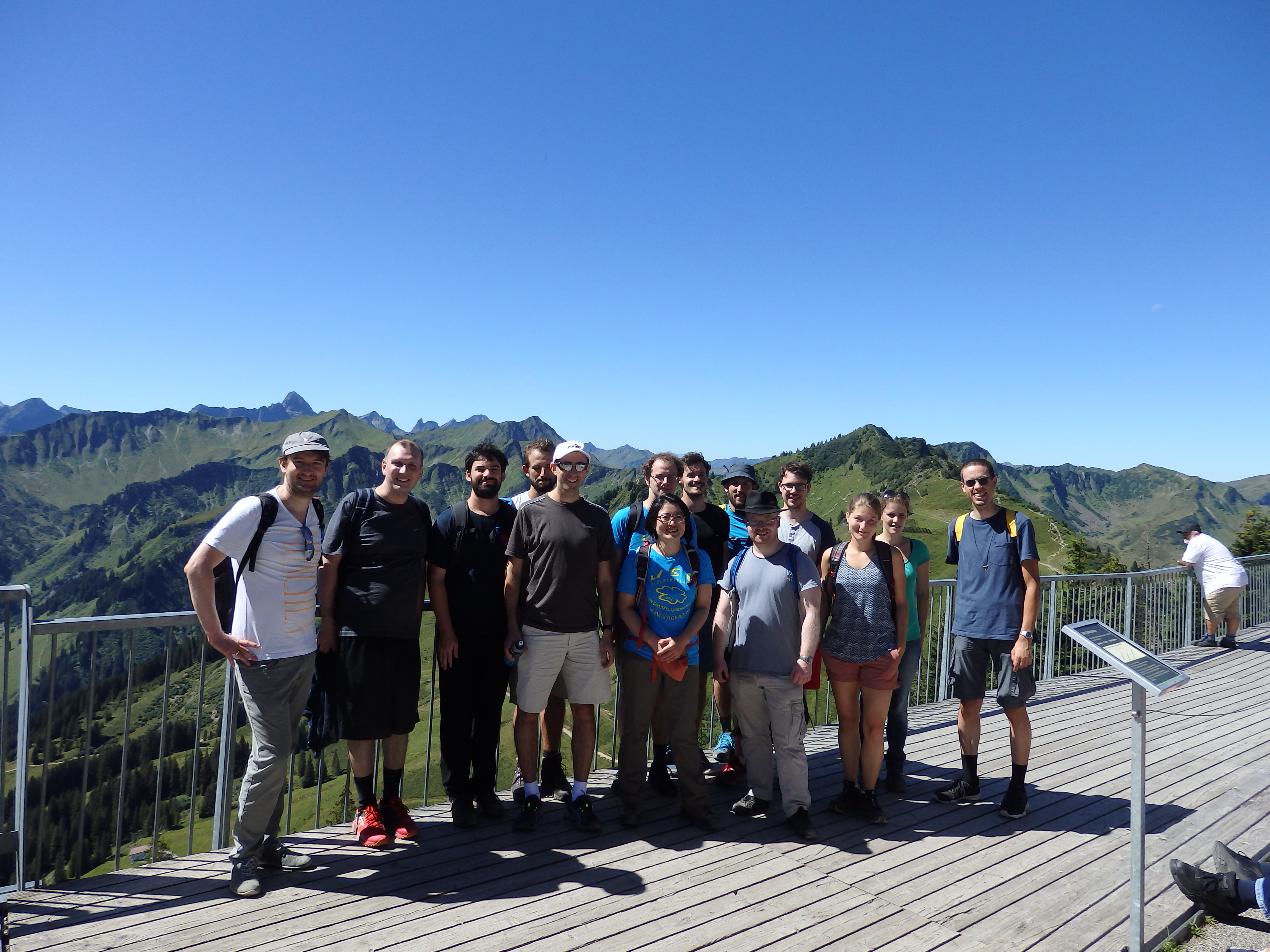|
Mihyun Kang - Main |
Publications |
Research Fields |
Academic Services |
Talks and Events |
Teaching |
Combinatorics Group
Research Grant ``Phase transitions and critical phenomena in random graphs''
Summary
Random graph models that this project focuses on are random graph processes and random hypergraphs.
The constraints imposed on these random graph models (in particular random graph processes)
lead to difficulties in the analysis of their asymptotic behaviour,
due to the long-term and/or global dependence between edges.
To overcome these difficulties, new approaches have to be found.
The main objective of this project is to advance analytic and probabilistic approaches
and to apply them to analyse asymptotic behaviour of such complex random graph models.
The scientific program of this project consists of two main themes,
which are closely related in that both themes deal with phase transitions and critical phenomena.
Grant Info
Supported by Austrian Science Fund (FWF), Grant no. P26826, 01.05.2014-31.12.2017
Team
- Oliver Cooley
- Chris Dowden
- Mihyun Kang (PI)
- Christoph Koch (PhD defence on November 25, 2016)
- Tamas Makai
Collaborators and visitors
- Bela Bollobas, University of Cambridge
- Amin Coja-Oghlan, Goethe University of Frankfurt
- Nikolaos Fountoulakis, University of Birmingham
- Penny Haxell, University of Waterloo
- Tobias Kapetanopoulos, Goethe-Universität Frankfurt
Jeong Han Kim, Korea Institute for Advanced Study (KIAS)
- Michael Krievelevich, Tel Aviv University
- Dieter Mitsche, Universite de Nice Sophia Antipolis
- Oleg Pikhurko, University of Warwick
- Moumanti Podder, New York University
- Kathrin Skubch, Goethe-Universität Frankfurt
- Joel Spencer, New York University
Publications
Journal Articles
- Mihyun Kang, Tamas Makai, and Oleg Pikhurko, Supersaturation problem for the bowtie, European Journal of Combinatorics (2020), 1-27. https://doi.org/10.1016/j.ejc.2020.103107.
- Oliver Cooley, Mihyun Kang, and Christoph Koch, The size of the giant component in random hypergraphs: a short proof, Electronic Journal of Combinatorics (2019), #P3.6.
- Amin Coja-Oghlan, Oliver Cooley, Mihyun Kang, and Kathrin Skubch,
Core forging and local limit theorems for the k-core of random graphs, Journal of Combinatorial Theory, Series B (2019), 178-231, doi: 10.1016/j.jctb.2018.12.005.
- Amin Coja-Oghlan, Charilaos Efthymiou, Nor Jaafari, Mihyun Kang, and Tobias Kapetanopoulos,
Charting the replica symmetric phase,
Communications in Mathematical Physics (2018), 1-96, doi: 10.1007/s00220-018-3096-x.
- Oliver Cooley, Mihyun Kang, and Christoph Koch,
The size of the giant high-order component in random hypergraphs,
Random Structures and Algorithms 53 (2018), 238-288, doi:10.1002/rsa.20761.
- Oliver Cooley, Mihyun Kang, and Yury Person,
Largest components in random hypergraphs, Combinatorics, Probability and Computing 27 (2018), 741-762, doi:10.1017.S096354831800010X.
- Nikolaos Fountoulakis, Mihyun Kang, Christoph Koch, and Tamas Makai,
A phase transition regarding the evolution of bootstrap processes in inhomogeneous random graphs, Annals of Applied Probability 28 (2018), 990-1051, doi:10.1214/17-AAP1324.
- Béla Bollobás, Oliver Cooley, Mihyun Kang, and Christoph Koch, Jigsaw percolation on random hypergraphs, Journal of Applied Probability 54 (2017), 1261-1277.
- Amin Coja-Oghlan, Oliver Cooley, Mihyun Kang, and Kathrin Skubch,
How does the core sit inside the mantle?, Random Structures and Algorithms 51 (2017), 459-482.
- Amin Coja-Oghlan, Oliver Cooley, Mihyun Kang, and Kathrin Skubch,
The minimum bisection in the planted bisection model, Theory of Computing 13 (2017), 1-22.
- Oliver Cooley, Mihyun Kang, and Christoph Koch,
Threshold and hitting time for high-order connectivity in random hypergraphs, Electronic Journal of Combinatorics 23 (2016), #P.48.
- Mihyun Kang, Michal Karonski, Christoph Koch, and Tamas Makai,
Properties of stochastic Kronecker graphs,
Journal of Combinatorics 6 (2015), 395-432.
-
Mihyun Kang, Christoph Koch, and Angélica Pachón,
The phase transition in a multi-type binomial random graph,
SIAM Journal on Discrete Mathematics 29 (2015), 1042-1064.
Articles in Peer-Reviewed Conference Proceedings
- Amin Coja-Oghlan, Charilaos Efthymiou, Nor Jaafari, Mihyun Kang and Tobias Kapetanopoulos,
Charting the replica symmetric phase.
In the Proceedings of the 21th International Workshop on Randomization and Computation (RANDOM 2017), 40:1-40:17.
- Mihyun Kang, Tamas Makai and Oleg Pikhurko,
Supersaturation Problem for the Bowtie.
In the Proceedings of the European Conference on Combinatorics, Graph Theory and Applications (EuroComb 2017), Electronic Notes in Discrete Mathematics 61 (2017), pp. 679-685.
- Mihyun Kang and Tamas Makai,
Bootstrap percolation on G(n,p) revisited. In the Proceedings of the 27th International Conference on Probabilistic, Combinatorial and Asymptotic Methods for the Analysis of Algorithms (AofA 2016), 225-236.
- Amin Coja-Oghlan, Oliver Cooley, Mihyun Kang, and Kathrin Skubch,
The minimum bisection in the planted bisection model.
In the Proceedings of the 19th International Workshop on Randomization and Computation (RANDOM 2015), Leibniz International Proceedings in Informatics (LIPIcs), pp. 710-725, 2015.
- Amin Coja-Oghlan, Oliver Cooley, Mihyun Kang, and Kathrin Skubch,
How does the core sit inside the mantle?.
In the Proceedings of the European Conference on Combinatorics, Graph Theory and Applications (EuroComb 2015), Electronic Notes in Discrete Mathematics (2015), pp. 489-496.
- Mihyun Kang, Christoph Koch, and Tamas Makai,
Bootstrap percolation in random k-uniform hypergraphs.
In the Proceedings of the European Conference on Combinatorics, Graph Theory and Applications (EuroComb 2015), Electronic Notes in Discrete Mathematics (2015), pp. 595-601.
- Oliver Cooley, Mihyun Kang, and Christoph Koch, Evolution of high-order connected components in random hypergraphs.
In the Proceedings of the European Conference on Combinatorics, Graph Theory and Applications (EuroComb 2015), Electronic Notes in Discrete Mathematics (2015), pp. 569-575.
Thesis
- Christoph Koch, Phase transition phenomena in random graphs and hypergraphs, PhD Thesis, November 2016
Joint Workshop of Goethe University Frankfurt and TU Graz, 21 - 26 August 2016, Söllerhaus at Hirschegg
 TU Graz Combinatorics Group
TU Graz Combinatorics Group
 Combinatorics Groups of TU Graz and Goethe Universität Frankfurt
Combinatorics Groups of TU Graz and Goethe Universität Frankfurt
last updated in March 2020
|